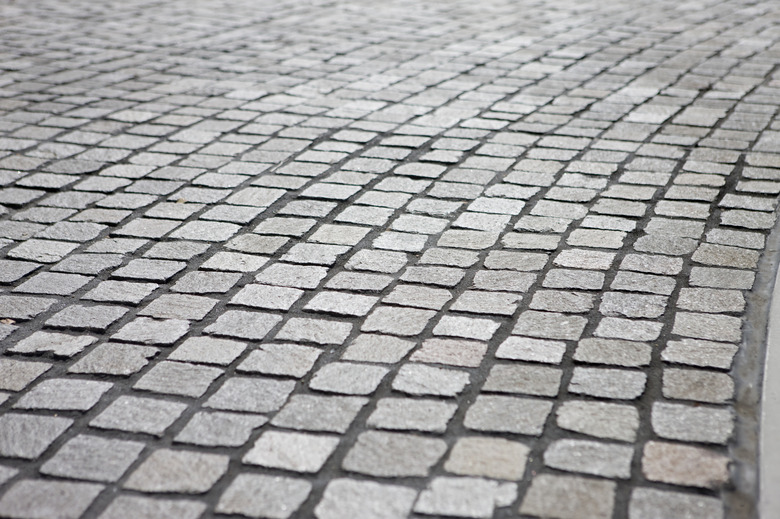How To Maintain Unilock Paving
Though concrete pavers require relatively little maintenance compared to other building materials, no product is truly maintenance-free. Maintaining Unilock pavers means utilizing proper cleaning and sealing techniques to keep the surface looking its best over the life of the stone.
Step 1
Unilock pavers use sand between the joints to lock the pavers together. If this sand is disturbed, the pavers could become loose and pose a tripping hazard. While Unilock points to spraying as an effective means of general cleaning, proper spray technique is critical to preserving the sand joints between pavers. Whether you're working with a garden hose or pressure sprayer, direct the water toward the surface at an angle of 30 degrees or less, and always spray diagonally to the joints. Use a wide-spray nozzle whenever possible, and replace sand that gets blown or sprayed away with fresh dry sand as soon as possible.
Eliminating Efflorescence
Step 1
New concrete pavers often develop a powdery or chalky white substance known as efflorescence. This effect occurs naturally when moisture causes calcium hydroxide to leach to the surface. After a season or two, this effect should stop, but if you're bothered by efflorescence, Unilock makes an efflorescence cleaner designed to remove white residue from pavers. The product can be mixed with water and applied with a pressure washer.
Step 2
- Unilock pavers use sand between the joints to lock the pavers together.
- While Unilock points to spraying as an effective means of general cleaning, proper spray technique is critical to preserving the sand joints between pavers.
Tackling Stains
Step 1
Concrete pavers face frequent wear and tear, along with exposure to oil, rust and other stains. If you spot an oil or grease stain on your Unilock pavers, pat at the spill with a dry cloth. Avoid rubbing, as this simply spreads the stain over a larger area. Apply detergent to the stain and let it sit for an hour or two, then rinse it with hot water. Alternatively, use Unilock oil and dirt remover. The company also makes a rust remover, which can remove ugly rust stains, as well as a product designed to lift off paint, tar or rubber stains. This product works best when allowed to soak into the pavers for a few minutes before rinsing with water.
Step 2
- Concrete pavers face frequent wear and tear, along with exposure to oil, rust and other stains.
- If you spot an oil or grease stain on your Unilock pavers, pat at the spill with a dry cloth.
Effective Sealing
Step 1
Adding sealant to concrete pavers not only helps prevent staining but also acts as a natural color enhancer. Unilock recommends waiting for a season to allow the efflorescence process to finish before before applying one of the company's sealers. Once the pavers are clean and dry, apply sealer using a simple foam roller, or use a low-pressure sprayer for larger areas. Reapply every two years, or after using Unilock rust remover.
